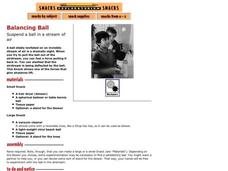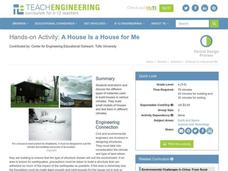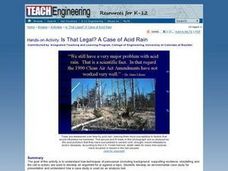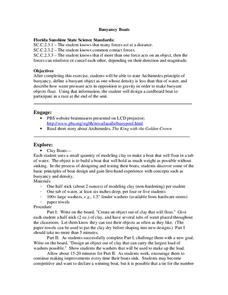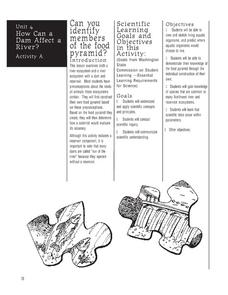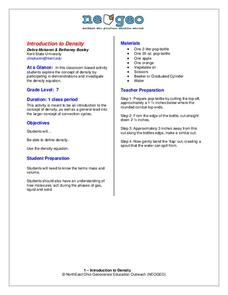Alabama Learning Exchange
The Five Senses: How They Relate to our World
Students explore the five senses and the significance of each sense. In this five senses and diversity lesson, students listen to You Can't Smell a Flower With Your Ear by Joanna Cole and take a walk observing opportunities to use all...
Exploratorium
Balancing Ball
Demonstrate lift to the class that is studying aerodynamics. In the stream of air produced by a blow dryer, little physicists place a wad of tissue paper and a spherical figure to compare. Or, if you have a vacuum cleaner and beach ball,...
Baylor College
There's Something in the Air
Clever! In order to compare indoor and outdoor dispersal rates for the movement of gases and particles through air, collaborators will participate in a classroom experiment. Set up a circular grid and set learners on lines that are...
Teach Engineering
Solar Power
Elementary schoolers discover how engineers use solar energy to heat buildings. They take a close look at some of the materials used: sand, salt, water, and shredded paper and evaluate the efficiency of each material. An incredible...
Curated OER
A House is a House for Me
Learners evaluate the impact climates have on the building of structures. They research the different types of materials used to build houses in various climates and build small models of houses which are tested against different climates.
Curated OER
Is That Legal? A Case of Acid Rain
Develop an environmental case study! Elementary learners discover how a case study is used as an analysis tool. The goal of this activity is to show pupils how techniques of persuasion (including background, supporting evidence,...
Curated OER
Modern Day Pyramids
Students investigate the ways in which ancient technologies - six types of simple machines and combinations - are used to construct modern buildings. As they work together to solve a design problem (designing and building a modern...
Teach Engineering
The Grid
Upper graders form a "Presidential Task Force," and attempt to make recommendations concerning the future of the national power grid. After a teacher-led discussion which proves that our nation's energy consumption will soon outpace our...
Captain Planet Foundation
Fall into Healthy Shapes
Kindergartners identify geometric shapes by planting a fall garden. They start their seeds in containers that have different shapes, and keep track of their plants based on those shapes. This brilliantly designed and incredibly thorough...
Exploratorium
Balancing Stick
Have some physical science fun when studying the center of gravity or center of mass. Simply have balancing artists stand a dowel on one finger and keep it from falling over! A lump of clay is added and moved up along the dowel over a...
Bonneville
How to Build a Turbine
Here is a six-minute video of a pair of electrical engineers that illustrate how to build a wind turbine. A list of materials is provided, along with general guidelines for your class. Use this to introduce turbine design to your...
American Chemical Society
Why Does Water Dissolve Sugar?
Did you know that if you wait long enough, the M on the outside of an M and M will float to the surface when submerged in water? Learners observe the sugar coating of an M and M while it is dissolving in water. They explain how this...
Odyssey of the Mind
Odyssey of the Mind Curriculum Activity: Making of a Monster
Over the course of a week, the class will study how monsters are portrayed throughout literature. But why? Monsters in science fiction or horror often depict the darker side of human nature; they are described for their horrific physical...
Bonneville
How to Build a Motor
Electrical engineers entertain and explain how to construct an electromagnet-driven motor. Kellie and Mike, the hosts of the show, are enthusiastic teachers that will help introduce a project that you likely include in your middle school...
Center for Precollegiate Education and Training
Buoyancy Boats
What did the sea say to the boat? Nothing, it just waved. An inquiry-based instructional activity starts with a simple concept on the Archimedes Principle and challenges pupils to make something out of clay that floats....
Howard Hughes Medical Institute
Drug Adherence and Resistance
The FDA approved more than 25 drugs to treat HIV—and often people must use them in combination. One of the largest challenges with these medications happens due to patient error. Class members use an interactive to learn about drug...
Teach Engineering
Breathing Cells
Pairs work together to determine whether unknown solutions are either acids or bases by using a red cabbage indicator solution. After determining the general pH of the unknown solution, classmates blow into the same indicator after...
Teach Engineering
Basically Acids
Base your lesson plan on acids and bases on an informative resource. The first installment of a five-part module on the science behind Harry Potter has individuals investigate acid/base chemistry with the use of invisible inks. They also...
Foundation for Water & Energy Education
How Can a Dam Affect a River? Activity A
Written for Washington state students in life science, this lesson provides an opportunity to examine the residents of local freshwater habitats. You or the class collects a water sample, and learners try to examine what organisms live...
Foundation for Water & Energy Education
How Can a Dam Affect a River? Activity B
Second in a pair of activities, young ecologists continue to examine the food pyramid of a freshwater ecosystem. They take a look at the food pyramid drawn in Activity A and consider what would happen if a reservoir was created on the...
Curated OER
A Honey of a Hexagon
Students explore how bees make honey and why the hexagon is the best basic pattern for the honeycomb through the use of a video and hands-on activities with honeycombs and geometric shapes.
Curated OER
When I Was Young In Appalachia
Students comapre and contrast the lifestyles of the people of the Applachian region with their own community through in-class discussions, creative projects, hands-on activities, food preservation, homemade remedies, home construction,...
NorthEast Ohio Geoscience Education Outreach
Introduction to Density
Seventh grade scientists weigh in on the concept of density. In a nutshell, they participate in the following activities:
Measurement of the mass and volume of fruit in order to compare densities
Measurement of the mass of oil and water...
Curated OER
Ocean Exhibits
Ninth graders create an ocean museum. They work in partners to create their own exhibit. Each exhibit must have an interactive computer placard containing their information. The exhibits must also have a hands-on component.



